Fleurs du Mal Magazine


Or see the index

Maison de la Poésie Paris: 7 femmes – Lydie Salvayre
Anne Alvaro, Hélène Babu, Marie-Armelle Deguy, Marianne Denicourt, Irène Jacob, Mireille Perrier & Lydie Salvayre
Adaptation Nadine Eghels – Mise en espace Ivan Morane – Production Textes & Voix Lecture à 7 voix
Pour la Journée de la Femme, la Maison de la Poésie présente un texte de Lydie Salvayre sur sept figures emblématiques de la littérature qui ont marqué sa vie. Pour cet exercice de portraitiste, Lydie Salvayre a choisi sept femmes : Emily Brönte, Colette, Virginia Woolf, Djuna Barnes, Marina Tsvetaeva, Ingeborg Bachmann et Sylvia Plath. Elles ont un point commun : leur relation à l’écriture est passionnelle, et, pour certaines d’entre elles, les a conduit au suicide. Dans l’atmosphère du Paris d’avant-guerre, des Années folles ou de la Russie stalinienne, elles ont témoigné à leur façon du monde dont elles ont souffert et qu’elles ont contribué à façonner. Le texte est porté par les voix de six magnifiques actrices, rejointes par l’auteur elle-même, et une musicienne. Il fait revivre l’histoire, la beauté, la démesure et la rébellion de ces femmes écrivains.
À lire – Lydie Salvayre, 7 Femmes, Perrin, 2013
Samedi 8 mars 2014 – 20H00 – Maison de la Poésie Paris
Passage Molière – 157, rue Saint-Martin – 75003 Paris – M° Rambuteau – RER Les Halles
# website maison de la poésie paris
fleursdumal.nl magazine
More in: Art & Literature News, Literary Events, Maison de la Poésie, Sylvia Plath
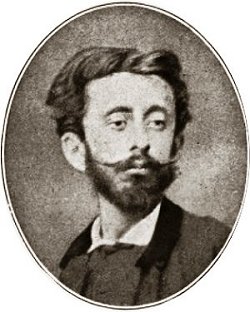
Tristan Corbière
(1845-1875)
A une camarade
Que me veux-tu donc, femme trois fois fille ?…
oi qui te croyais un si bon enfant !
– De l’amour?… – Allons : cherche, apporte, pille !
‘aimer aussi, toi ! .., moi qui t’aimais tant.
Oh ! je t’aimais comme.. un lézard qui pèle
Aime le rayon qui cuit son sommeil…
L’Amour entre nous vient battre de l’aile :
– Eh ! qu’il s’ôte de devant mon soleil !
on amour, à moi, n’aime pas qu’on l’aime ;
endiant, il a peur d’être écouté…
C’est un lazzarone enfin, un bohème,
Déjeunant de jeûne et de liberté.
– Curiosité, bibelot, bricole ?…
C’est possible : il est rare – et c’est son bien –
ais un bibelot cassé se recolle ;
Et lui, décollé, ne vaudra plus rien ! …
Va, n’enfonçons pas la porte entr’ouverte
Sur un paradis déjà trop rendu !
Et gardons à la pomme, jadis verte,
Sa peau, sous son fard de fruit défendu.
Que nous sommes-nous donc fait l’un à l’autre ?…
– Rien… – Peut-être alors que c’est pour cela ;
– Quel a commencé? – Pas moi, bon apôtre !
Après, quel dira : c’est donc tout – voilà !
– Tous les deux, sans doute… – Et toi, sois bien sûre
Que c’est encor moi le plus attrapé :
Car si, par erreur, ou par aventure,
Tu ne me trompais.., je serais trompé !
Appelons cela : l’amitié calmée ;
Puisque l’amour veut mettre son holà.
N’y croyons pas trop, chère mal-aimée…
– C’est toujours trop vrai ces mensonges-là ! –
Nous pourrons, au moins, ne pas nous maudire
– Si ça t’est égal – le quart-d’heure après.
Si nous en mourons – ce sera de rire…
oi qui l’aimais tant ton rire si frais !
Tristan Corbière poetry
fleursdumal.nl magazine
More in: *Archive Les Poètes Maudits, - Archive Tombeau de la jeunesse, Archive C-D, CLASSIC POETRY, Corbière, Tristan
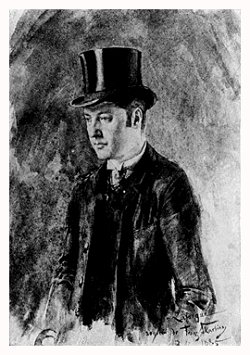
Jules Laforgue
(1860-1887)
Hypertrophie
Astres lointains des soirs, musiques infinies,
Ce Coeur universel ruisselant de douceur
Est le coeur de la Terre et de ses insomnies.
En un pantoum sans fin, magique et guérisseur
Bercez la Terre, votre soeur.
Le doux sang de l’Hostie a filtré dans mes moelles,
J’asperge les couchants de tragiques rougeurs,
Je palpite d’exil dans le coeur des étoiles,
Mon spleen fouette les grands nuages voyageurs.
Je beugle dans les vents rageurs.
Aimez-moi. Bercez-moi. Le cœur de l’oeuvre immense
Vers qui l’Océan noir pleurait, c’est moi qui l’ai.
Je suis le coeur de tout, et je saigne en démence
Et déborde d’amour par l’azur constellé,
Enfin ! que tout soit consolé.
Pauvre petit coeur sur la main,
La vie n’est pas folle pour nous
De sourires, ni de festins,
Ni de fêtes : et, de gros sous ?
Elle ne nous a pas gâtés
Et ne nous fait pas bon visage
Comme on fait à ces Enfants sages
Que nous sommes, en vérité.
Si sages nous ! Et, si peu fière
Notre façon d’être avec elle ;
Francs aussi, comme la lumière
Nous voudrions la trouver belle
Autant que d’Autres – pourtant quels ?
Et pieux, charger ses autels
Des plus belles fleurs du parterre
Et des meilleurs fruits de la terre.
Mais d’ailleurs, nous ne lui devrons
Que du respect, tout juste assez,
Qu’il faut professer envers ces
Empêcheurs de danser en rond.
Jules Laforgue poetry
fleursdumal.nl magazine
More in: - Archive Tombeau de la jeunesse, Archive K-L, CLASSIC POETRY

Thomas Chatterton
(1752-1770)
Song from Ælla
SING unto my roundelay,
O drop the briny tear with me;
Dance no more at holyday,
Like a running river be:
My love is dead,
Gone to his death-bed
All under the willow-tree.
Black his cryne [1] as the winter night,
White his rode [2] as the summer snow,
Red his face as the morning light,
Cole he lies in the grave below:
My love is dead,
Gone to his death-bed
All under the willow-tree.
Sweet his tongue as the throstle’s note,
Quick in dance as thought can be,
Deft his tabor, cudgel stout;
O he lies by the willow-tree!
My love is dead,
Gone to his death-bed
All under the willow-tree.
Hark! the raven flaps his wing
In the brier’d dell below;
Hark! the death-owl loud doth sing
To the nightmares, as they go:
My love is dead,
Gone to his death-bed
All under the willow-tree.
See! the white moon shines on high;
Whiter is my true-love’s shroud:
Whiter than the morning sky,
Whiter than the evening cloud:
My love is dead,
Gone to his death-bed
All under the willow-tree.
Here upon my true-love’s grave
Shall the barren flowers be laid;
Not one holy saint to save
All the coldness of a maid:
My love is dead,
Gone to his death-bed
All under the willow-tree.
With my hands I’ll dent the briers
Round his holy corse to gre [3]:
Ouph [4] and fairy, light your fires,
Here my body still shall be:
My love is dead,
Gone to his death-bed
All under the willow-tree.
Come, with acorn-cup and thorn,
Drain my heartès blood away;
Life and all its good I scorn,
Dance by night, or feast by day:
My love is dead,
Gone to his death-bed
All under the willow-tree.
1 cryne – hair
2 rode – complexion
3 gre – grow
4 ouph – elf
Thomas Chatterton poetry
fleursdumal.nl magazine
More in: Archive C-D, Thomas Chatterton
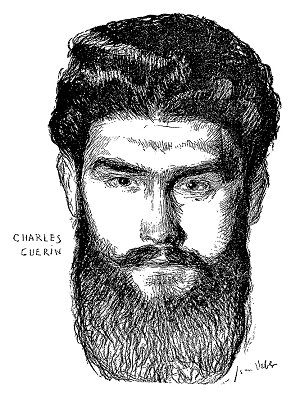
Charles Guérin
(1873 – 1907 )
Epitaphe pour lui-même
Il fut le très subtil musicien des vents
Qui se plaignent en de nocturnes symphonies ;
Il nota le murmure des herbes jaunies
Entre les pavés gris des cours d’anciens couvents.
Il trouva sur la viole des dévots servants
Pour ses maîtresses des tendresses infinies ;
Il égrena les ineffables litanies
Ou s’alanguissent tous les amoureux fervents.
Un soir, la chair brisée aux voluptés divines,
Il détourna du ciel son front fleuri d’épines,
Et se coucha, les pieds meurtris et le coeur las.
Ô toi, qui, dégoûté du rire et de la lutte
Odieuse, vibras aux sanglots de sa flûte,
Poète, ralentis le pas : cy dort Heirclas.
Charles Guérin poetry
fleursdumal.nl magazine
More in: - Archive Tombeau de la jeunesse, Archive G-H, CLASSIC POETRY
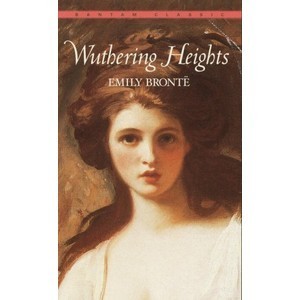
Emily Bronte
(1818-1848)
No Coward Soul Is Mine
No coward soul is mine,
No trembler in the world’s storm-troubled sphere:
I see Heaven’s glories shine,
And faith shines equal, arming me from fear.
O God within my breast,
Almighty, ever-present Deity!
Life–that in me has rest,
As I–undying Life–have Power in Thee!
Vain are the thousand creeds
That move men’s hearts: unutterably vain;
Worthless as withered weeds,
Or idlest froth amid the boundless main,
To waken doubt in one
Holding so fast by thine infinity;
So surely anchored on
The steadfast rock of immortality.
With wide-embracing love
Thy spirit animates eternal years,
Pervades and broods above,
Changes, sustains, dissolves, creates, and rears.
Though earth and man were gone,
And suns and universes ceased to be,
And Thou wert left alone,
Every existence would exist in Thee.
There is not room for Death,
Nor atom that his might could render void:
Thou–Thou art Being and Breath,
And what Thou art may never be destroyed.
Emily Jane Brontë poetry
fleursdumal.nl magazine
More in: Anne, Emily & Charlotte Brontë, Archive A-B, Brontë, Anne, Emily & Charlotte
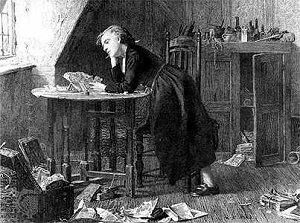
Thomas Chatterton
(1752-1770)
AN EXCELENTE BALADE OF CHARITIE
N Virgynë the sweltrie sun gan sheene,
And hotte upon the mees did caste his raie;
The apple rodded from its palie greene,
And the mole peare did bende the leafy spraie;
The peede chelandri sunge the livelong daie;
‘Twas nowe the pride, the manhode of the yeare,
And eke the grounde was dighte in its moste defte aumere.
The sun was glemeing in the midde of daie,
Deadde still the aire, and eke the welken blue,
When from the sea arist in drear arraie
A hepe of cloudes of sable sullen hue,
The which full fast unto the woodlande drewe,
Hiltring attenes the sunnis fetive face,
And the blacke tempeste swolne and gatherd up apace.
Beneathe an holme, faste by a pathwaie side,
Which dide unto Seyncte Godwine’s covent lede,
A hapless pilgrim moneynge did abide.
Pore in his newe, ungentle in his weede,
Longe bretful of the miseries of neede,
Where from the hail-stone coulde the almer flie?
He had no housen theere, ne anie covent nie.
Look in his glommed face, his sprighte there scanne;
Howe woe-be-gone, how withered, forwynd, deade!
Haste to thie church-glebe-house, asshrewed manne!
Haste to thie kiste, thie onlie dortoure bedde.
Cale, as the claie whiche will gre on thie hedde,
Is Charitie and Love aminge highe elves;
Knightis and Barons live for pleasure and themselves.
The gatherd storme is rype; the bigge drops falle;
The forswat meadowes smethe, and drenche the raine;
The comyng ghastness do the cattle pall,
And the full flockes are drivynge ore the plaine;
Dashde from the cloudes the waters flott againe;
The welkin opes; the yellow levynne flies;
And the hot fierie smothe in the wide lowings dies.
Liste! now the thunder’s rattling clymmynge sound
Cheves slowlie on, and then embollen clangs,
Shakes the hie spyre, and losst, dispended, drown’d,
Still on the gallard eare of terroure hanges;
The windes are up; the lofty elmen swanges;
Again the levynne and the thunder poures,
And the full cloudes are braste attenes in stonen showers.
Spurreynge his palfrie oere the watrie plaine,
The Abbote of Seyncte Godwynes convente came;
His chapournette was drented with the reine,
And his pencte gyrdle met with mickle shame;
He aynewarde tolde his bederoll at the same;
The storme encreasen, and he drew aside,
With the mist almes craver neere to the holme to bide.
His cope was all of Lyncolne clothe so fyne,
With a gold button fasten’d neere his chynne;
His autremete was edged with golden twynne,
And his shoone pyke a loverds mighte have binne;
Full well it shewn he thoughten coste no sinne:
The trammels of the palfrye pleasde his sighte,
For the horse-millanare his head with roses dighte.
“An almes, sir prieste!” the droppynge pilgrim saide,
“O! let me waite within your covente dore,
Till the sunne sheneth hie above our heade,
And the loude tempeste of the aire is oer;
Helpless and ould am I alas! and poor;
No house, ne friend, ne moneie in my pouche;
All yatte I call my owne is this my silver crouche.”
“Varlet,” replyd the Abbatte, “cease your dinne;
This is no season almes and prayers to give;
Mie porter never lets a faitour in;
None touch mie rynge who not in honour live.”
And now the sonne with the blacke cloudes did stryve,
And shettynge on the grounde his glairie raie,
The Abbatte spurrde his steede, and eftsoones roadde awaie.
Once moe the skie was blacke, the thunder rolde;
Faste reyneynge oer the plaine a prieste was seen;
Ne dighte full proude, ne buttoned up in golde;
His cope and jape were graie, and eke were clene;
A Limitoure he was of order seene;
And from the pathwaie side then turned hee,
Where the pore almer laie binethe the holmen tree.
“An almes, sir priest!” the droppynge pilgrim sayde,
“For sweete Seyncte Marie and your order sake.”
The Limitoure then loosen’d his pouche threade,
And did thereoute a groate of silver take;
The mister pilgrim dyd for halline shake.
“Here take this silver, it maie eathe thie care;
We are Goddes stewards all, nete of oure owne we bare.
“But ah! unhailie pilgrim, lerne of me,
Scathe anie give a rentrolle to their Lorde.
Here take my semecope, thou arte bare I see;
Tis thyne; the Seynctes will give me mie rewarde.”
He left the pilgrim, and his waie aborde.
Virgynne and hallie Seyncte, who sitte yn gloure,
Or give the mittee will, or give the gode man power.
Thomas Chatterton poetry
fleursdumal.nl magazine
More in: Archive C-D, Thomas Chatterton
![]()
Anne Boleyn
(1507?-1536)
O Death, Rock Me Asleep
DEATH, rock me asleep,
Bring me to quiet rest,
Let pass my weary guiltless ghost
Out of my careful breast.
Toll on, thou passing bell;
Ring out my doleful knell;
Let thy sound my death tell.
Death doth draw nigh;
There is no remedy.
My pains who can express?
Alas, they are so strong;
My dolour will not suffer strength
My life for to prolong.
Toll on, thou passing bell;
Ring out my doleful knell;
Let thy sound my death tell.
Death doth draw nigh;
There is no remedy.
Alone in prison strong
I wait my destiny.
Woe worth this cruel hap that I
Should taste this misery!
Toll on, thou passing bell;
Ring out my doleful knell;
Let thy sound my death tell.
Death doth draw nigh;
There is no remedy.
Farewell, my pleasures past,
Welcome, my present pain!
I feel my torments so increase
That life cannot remain.
Cease now, thou passing bell;
Rung is my doleful knell;
For the sound my death doth tell.
Death doth draw nigh;
There is no remedy.
Anne Boleyn poetry
fleursdumal.nl magazine
More in: Anne Boleyn, Archive A-B
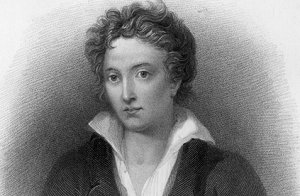
Percy Bysshe Shelley
(1792 – 1822)
Good-night
Good-night? ah! no; the hour is ill
Which severs those it should unite;
Let us remain together still,
Then it will be good night.
How can I call the lone night good,
Though thy sweet wishes wing its flight?
Be it not said, thought, understood —
Then it will be — good night.
To hearts which near each other move
From evening close to morning light,
The night is good; because, my love,
They never say good-night.
Percy Bysshe Shelley poetry
• fleursdumal.nl magazine
More in: Archive S-T, Percy Byssche Shelley, Shelley, Percy Byssche

Elizabeth (Lizzie) Siddal
(1829-1862)
Lord May I Come?
Life and night are falling from me,
Death and day are opening on me,
Wherever my footsteps come and go,
Life is a stony way of woe.
Lord, have I long to go?
Hallow hearts are ever near me,
Soulless eyes have ceased to cheer me:
Lord may I come to thee?
Life and youth and summer weather
To my heart no joy can gather.
Lord, lift me from life’s stony way!
Loved eyes long closed in death watch for me:
Holy death is waiting for me
Lord, may I come to-day?
My outward life feels sad and still
Like lilies in a frozen rill;
I am gazing upwards to the sun,
Lord, Lord, remembering my lost one.
O Lord, remember me!
How is it in the unknown land?
Do the dead wander hand in hand?
God, give me trust in thee.
Do we clasp dead hands and quiver
With an endless joy for ever?
Do tall white angels gaze and wend
Along the banks where lilies bend?
Lord, we know not how this may be:
Good Lord we put our faith in thee
O God, remember me.
Elizabeth (Lizzie) Siddal poems
fleursdumal.nl magazine
More in: Archive S-T, Lizzy Siddal, Siddal, Lizzy
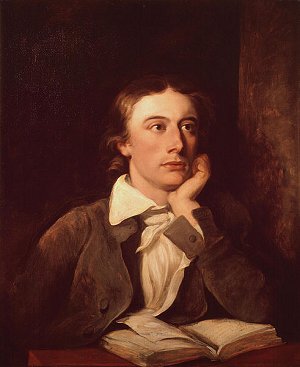
John Keats
(1795 – 1821)
When I Have Fears
When I have fears that I may cease to be
Before my pen has gleaned my teeming brain,
Before high-piled books, in charactery,
Hold like rich garners the full ripened grain;
When I behold, upon the night’s starred face,
Huge cloudy symbols of a high romance,
And think that I may never live to trace
Their shadows, with the magic hand of chance;
And when I feel, fair creature of an hour,
That I shall never look upon thee more,
Never have relish in the fairy power
Of unreflecting love; – then on the shore
Of the wide world I stand alone, and think
Till love and fame to nothingness do sink.
John Keats poetry
fleursdumal.nl magazine
More in: Archive K-L, John Keats, Keats, John

Albertine Kehrer
(1826-1852)
Verloren vriendschap
Weer een schoone droom vervlogen,
Ligt voor de aard te schoon, helaas!
Weder voor een zoete logen
Bittre waarheid in de plaats!
Bloesems mijner vreugd bedorven,
Ach! een ideaal gestorven,
Neen, meêdoogenloos vermoord
Met een enkel, vlijmend woord!
Toch, toch dank ik uwe opregtheid
Die dat woord mij deed verstaan,
En geen ander mijn gehechtheid
Zulk een wonde heeft doen slaan!
De eenzame avond, mijn vertrouwde,
– Vaak getuige van mijn strijd –
Die ook nu mijn smart aanschouwde,
Weet, dat ik u niets verwijt!
God, die aller menschen harten,
Als zijn waterbeken leidt;
Die zijn kindren onder smarten
Opvoedt tot zijn heerlijkheid,
Heeft dat leed mij toegewogen,
Heeft dien beker toebereid.
‘k Hief mijn hart, mijn schreijende oogen
‘k Zond mijn zuchten en gebeên,
Naar mijn Vader vol meêdoogen,
Naar zijn open hemel heen,
Naar mijn Vader in den hoogen
Die geen lust schept in ‘t geween,
En uit wellust nimmer plaagde…
‘k Bad, en ‘t licht zijns troostes daagde
Scheemrend door mijn tranen heen:
‘Vader! dat het vuur dier smarte
Loutrend door mijn ziele ga!
Wil haar heilgen aan mijn harte
Door de kracht van uw genâ!
Leer mij niets van de aard te vragen;
U beminnen, U alleen;
Trek mijn hart naar boven heen,
Zij ‘t ook onder leed en plagen…
Gij geeft balsem bij uw slagen!’
Albertine Kehrer poetry
fleursdumal.nl magazine
More in: Albertine Kehrer, Archive K-L, Kehrer, Albertine
Thank you for reading Fleurs du Mal - magazine for art & literature